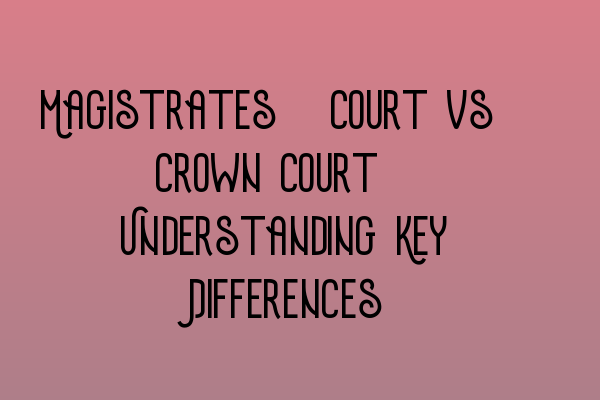Magistrates’ Court vs. Crown Court: Understanding Key Differences
Welcome to SQE Criminal Law & Practice Law UK! As a solicitor, writer, and SEO expert, I’m here to provide you with valuable insights into the legal system. In this blog post, we’ll explore the key differences between Magistrates’ Court and Crown Court, two crucial components of the criminal justice system.
Magistrates’ Court
Magistrates’ Court, also known as the lower court, handles minor criminal cases and some civil matters. It is presided over by a magistrate or a panel of magistrates, who are legally trained but not typically qualified as solicitors or barristers. The procedures in Magistrates’ Court are simpler and less formal compared to Crown Court.
Common types of cases heard in Magistrates’ Court include summary offenses like minor assaults, motoring offenses, and low-value thefts. The sentencing powers of Magistrates’ Court are limited, usually imposing fines, community orders, or short custodial sentences of up to six months.
Crown Court
Crown Court, on the other hand, deals with more serious criminal cases and appeals from Magistrates’ Court. Unlike Magistrates’ Court, Crown Court is presided over by a judge and a jury, consisting of 12 members of the public. The role of the judge is to ensure a fair trial, interpret the law, and provide guidance to the jury.
Crown Court handles indictable offenses, which are more serious crimes such as murder, rape, and robbery. The sentencing powers of Crown Court are more extensive, allowing for longer custodial sentences, including life imprisonment. The jury determines guilt or innocence based on the evidence presented during the trial.
Key Differences
Now that we have a basic understanding of Magistrates’ Court and Crown Court, let’s compare the key differences between the two:
Legal Professionals
In Magistrates’ Court, cases are heard by magistrates who are volunteers from the local community. They receive training but are not qualified as solicitors or barristers. Crown Court, on the other hand, has professional judges and barristers who are legally qualified and experienced in criminal law.
Evidence and Procedure
Magistrates’ Court follows a less formal procedure and considers evidence presented by the prosecution and the defense. Crown Court, being a higher court, applies stricter rules of evidence and may involve expert witnesses and more complex legal arguments.
Sentencing Powers
Magistrates’ Court has limited sentencing powers, mainly imposing fines and short custodial sentences. In Crown Court, the judge has broader discretion and can hand down more severe punishments, including life imprisonment for the most serious offenses.
Conclusion
Understanding the distinctions between Magistrates’ Court and Crown Court is essential when navigating the criminal justice system. If you have further questions or require legal representation, SQE Criminal Law & Practice Law UK is here to assist you. Feel free to explore our related articles and courses:
- SQE 1 Practice Exam Questions
- SQE 1 Practice Mocks FLK1 FLK2
- SQE 2 Preparation Courses
- SQE 1 Preparation Courses
- SRA SQE Exam Dates
Stay informed, stay protected, and trust SQE Criminal Law & Practice Law UK for all your legal needs.
